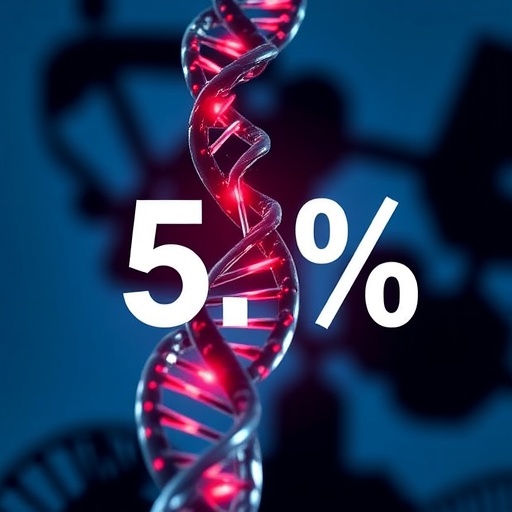Groundbreaking Cleveland Clinic research has unveiled that approximately 5% of the American population—roughly 17 million individuals—harbor genetic mutations associated with an increased risk of cancer. These findings, published in the prestigious Journal of the American Medical Association (JAMA), challenge the long-standing notion that genetic predisposition to cancer is predominantly confined to those with a discernible family history or other conventional risk factors. The implications of this research suggest a pressing need to reconsider current genetic screening guidelines and expand cancer surveillance protocols across broader sections of the population.
The investigative team behind this study included experts such as Dr. Joshua Arbesman and Dr. Ying Ni, who meticulously analyzed genetic and clinical data sourced from the National Institutes of Health’s All of Us Research Program. This unprecedented database, encompassing over 400,000 participants, allowed for a comprehensive assessment of genetic variations related to oncogenesis. The scale and diversity of this dataset represent a significant advancement in population-scale genetic epidemiology, offering profound insights that were previously unattainable through smaller cohorts or selective sampling.
Traditionally, genetic testing for cancer susceptibility has been targeted almost exclusively toward individuals exhibiting either a strong hereditary cancer history or identified high-risk clinical indicators. However, this study reveals that many carriers of pathogenic germline variants fall outside these conventional categories, inadvertently evading early detection efforts. Such a revelation underscores the latent prevalence of high-risk genetic variants within ostensibly low-risk groups, necessitating a paradigm shift in clinical practice toward more inclusive screening strategies.
Focusing on over 70 well-established cancer-associated genes, the researchers identified more than 3,400 unique mutations indicative of pathogenic potential. These variants span critical genes involved in DNA repair, cell cycle regulation, and tumor suppression, underscoring the complex molecular underpinnings of inherited cancer risk. The identification of such a wide mutational spectrum enhances our understanding of genetic cancer predisposition beyond common variants, illuminating pathways that may be amenable to targeted intervention or surveillance.
Of particular note is the study’s connection to prior work by Drs. Arbesman and Ni, which revealed that hereditary melanoma risk linked to genetic predisposition is substantially underappreciated—being approximately 7.5 times greater than current national guideline estimates. This insight has profound clinical ramifications, suggesting that current risk assessment algorithms may systematically underestimate cancer susceptibility in diverse populations, leading to missed opportunities for timely intervention.
The implications of this research extend into the translational domain, where enhanced genetic screening could serve as a cornerstone for precision oncology aimed at early cancer detection and prevention. As next-generation sequencing technologies become more accessible and affordable, integrating broad germline variant screening into routine clinical workflows could identify at-risk individuals before malignancy onset, enabling proactive management through tailored screening schedules and preventive therapeutics.
Beyond genetic testing itself, the study highlights the indispensable value of routine cancer screenings such as mammograms and colonoscopies for the general population, irrespective of perceived genetic risk. The prevalence of pathogenic variants in ostensibly low-risk individuals supports universal screening paradigms, which could dramatically reduce cancer mortality through early-stage detection and intervention.
Dr. Arbesman emphasizes the potential of assembling a comprehensive catalog of cancer susceptibility genes that could inform precision screening and prevention protocols. Such an endeavor would leverage genomic data to stratify risk with unprecedented accuracy, transforming public health efforts to combat cancer through informed, personalized care pathways rather than one-size-fits-all approaches.
The methodology of this study capitalized on advanced bioinformatics tools to interrogate large-scale genomic datasets, parsing out variants classified as pathogenic or likely pathogenic based on rigorous criteria established by clinical genomics consortia. This techniques-driven approach ensures high confidence in variant pathogenicity assignments, thereby enhancing the translational fidelity of the findings to clinical recommendations and public health policy.
Moreover, the study’s expansive dataset enables nuanced analyses incorporating demographic, clinical, and lifestyle covariates alongside genomic data. Such integrative models permit a more precise delineation of cancer risk attributable to hereditary factors versus environmental or behavioral influences, refining risk stratification frameworks and reducing false positives in genetic screening efforts.
Going forward, the research team advocates for longitudinal studies that track mutation carriers over time, evaluating cancer incidence, progression, and response to preventive measures. This longitudinal perspective is crucial for validating the predictive power of genetic markers and optimizing intervention strategies to maximize clinical benefit while mitigating potential harms from overdiagnosis or overtreatment.
In conclusion, this landmark study represents a watershed moment in cancer genomics, unveiling a far more pervasive landscape of genetic cancer susceptibility than previously appreciated. By illuminating the hidden burden of pathogenic germline variants across the wider population and advocating for expanded screening initiatives, the research paves the way for a new era in cancer prevention and personalized medicine—one where genetic insights translate into tangible reductions in cancer morbidity and mortality on a population scale.
Subject of Research: Genetic prevalence of cancer susceptibility mutations in the general American population
Article Title: Pathogenic Germline Variants in Cancer Susceptibility Genes
News Publication Date: 16-Oct-2025
Web References: DOI link
Keywords: Cancer risk, Oncology, Cancer screening, Cancer genetics, Cancer genomics




